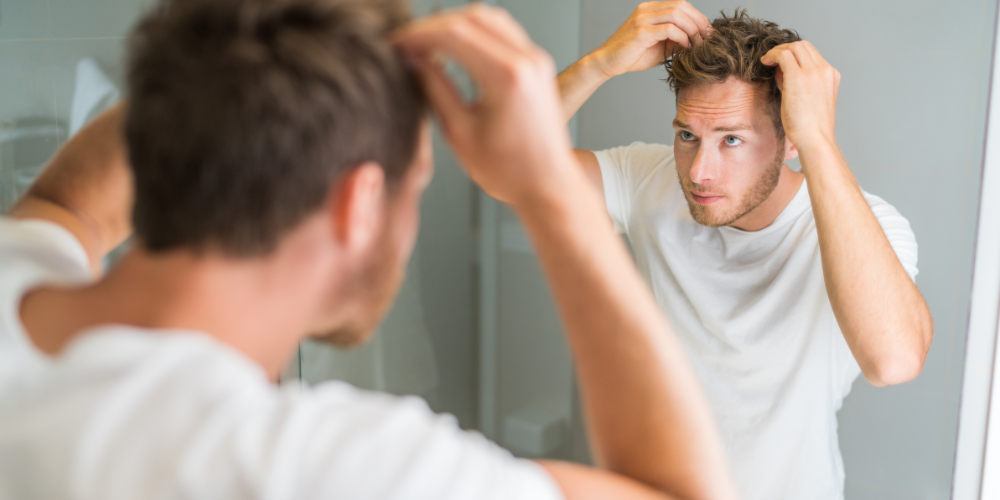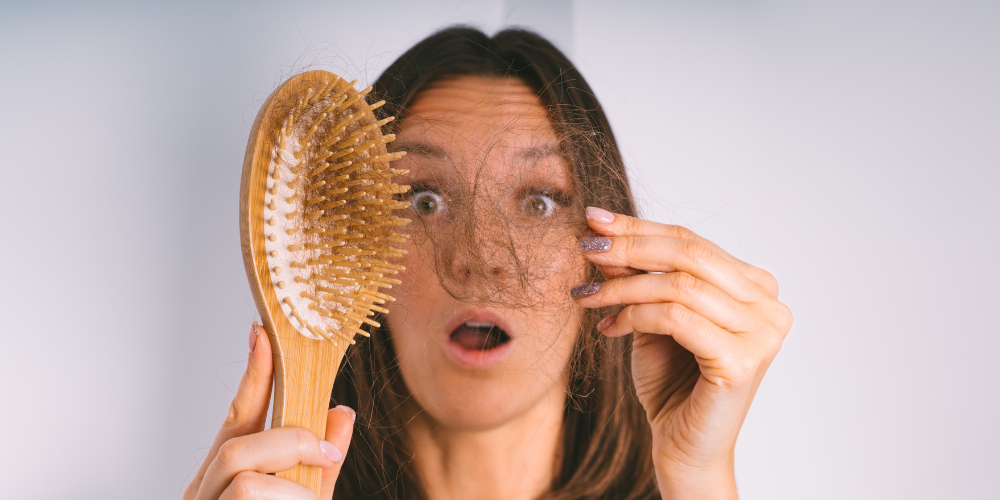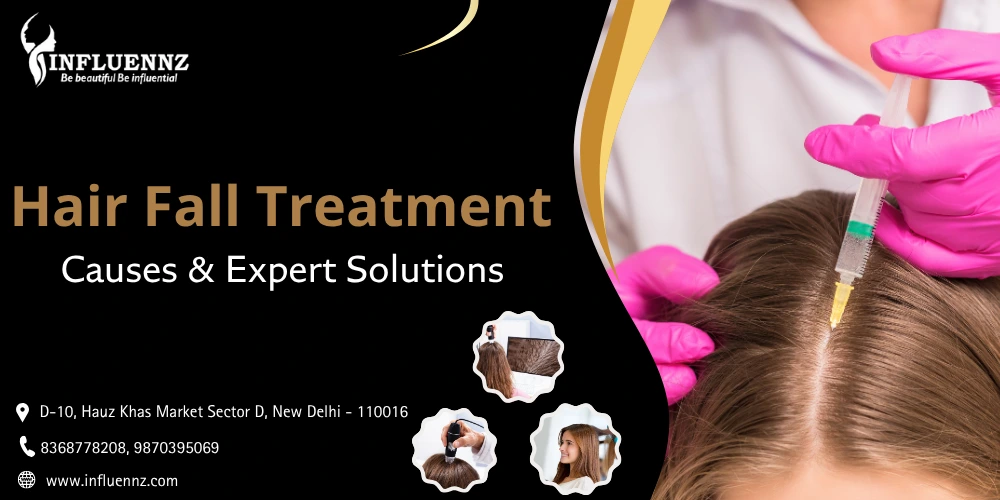Hair is the crown you wear every day. A long, thick ponytail or a voluminous braid is a dream for many. It’s not just women who wish for healthy, beautiful hair – men also aspire to thick, lustrous locks like Bollywood stars Kartik Aryan and Shahrukh Khan. Hair not only adds to your aesthetic appeal but also boosts your confidence. Unfortunately, hair fall has become an increasingly common problem, especially in urban settings like South Delhi. But what’s causing this surge in hair fall, and how can you find the right hair fall treatment to address it effectively?
What Causes Hair Fall in Delhi?
The causes of hair fall are multifaceted, often linked to modern lifestyle factors. The food we consume, the water we drink, and the environmental conditions we face daily all play a role in disrupting the body’s natural balance. For instance, many so-called “health foods” are mass-produced using pesticides and fertilizers, which can negatively impact hormonal balance and, consequently, hair growth.
Top Causes of Hair Fall in Males:
- Male Patterned Baldness (Androgenetic Alopecia): The most common cause of hair fall in men, often genetic, leading to a gradual thinning of hair around the temples and crown.
- Telogen Effluvium: Stress or illness can push a large number of hair follicles into the shedding phase, resulting in noticeable hair fall.
- Alopecia Areata: An autoimmune condition that causes sudden, patchy hair loss.

Top Causes of Hair Fall in Females:
- Chronic Telogen Effluvium: Often triggered by stress or hormonal fluctuations, this condition leads to widespread thinning and shedding of hair.
- Female Patterned Hair Loss: Similar to male pattern baldness, it affects women’s hairlines or crowns.
- Traction Alopecia: Caused by excessive tension on the hair due to tight hairstyles like ponytails, braids, or buns.
- Bubble Hair Syndrome: A rare condition that causes bubbles to form inside hair shafts, leading to breakage and hair fall.

Recommended Treatments from AIIMS Dermatologist: Hair Fall Solutions
When battling hair fall, consulting a dermatologist for expert advice is crucial. Here are some treatments recommended by experts for restoring hair health:
- Topical Minoxidil: The most common and widely recommended over-the-counter solution for hair regrowth. Minoxidil promotes hair follicle activity and can be used by both men and women.
- Cyclical Vitamin Therapy: Supplements like Hair Fact and Trichospire Kits support hair health by providing essential nutrients that promote growth and prevent hair loss. These include vitamins like biotin and folic acid, which are vital for healthy hair.
- Oral DHT Blockers (Finasteride and Dutasteride): These medications block dihydrotestosterone (DHT), a hormone linked to hair loss in both men and women. However, they can cause sexual side effects in a small percentage of users.
- Low-Level Light Therapy: An FDA-approved treatment that uses LED lights to stimulate collagen production and improve hair density. This non-invasive therapy has shown promising results in promoting hair regrowth.
- Hair PRP (Platelet-Rich Plasma) and GFC (Growth Factor Concentrates): These treatments use growth factors extracted from the patient’s own blood to promote hair regrowth. The first two sessions primarily slow hair fall, while subsequent sessions improve hair thickness and density.
- QR678: A plant-based, vegan alternative to PRP, QR678 is considered superior due to its quick, painless procedure. It doesn’t require maintenance sessions, making it a convenient option for those looking for long-lasting results.
- Exosomes Therapy: These messenger molecules, when combined with microneedling or Millifrac, help stimulate hair growth by promoting better skin and follicle regeneration.
- Hair Mesotherapy: The process of injecting essential nutrients directly into the scalp to improve hair follicle health, promoting faster growth and reducing shedding, is called hair mesotherapy.
- Stem Cell Therapy (Progenera): Utilizes adipocyte-derived stem cell factors to stimulate new hair growth with just one session per month, offering a breakthrough solution for chronic hair fall.
- Hair Transplant: The most permanent solution for baldness is hair transplant. It involves relocating healthy hair follicles from the back or sides of the scalp to balding areas, ensuring lasting results.
Home Care and Diet Tips for Hair Fall
While professional treatments are often necessary, don’t forget the importance of home care and diet in maintaining healthy hair.
- Eat Green Leafy Vegetables: Rich in iron, vitamins, and minerals, leafy greens help nourish hair follicles and encourage healthy growth.
- Consume a Protein-Rich Diet: Hair is primarily made of keratin, a protein. A diet rich in lean proteins, such as chicken, fish, and legumes, promotes hair strength.
- Onion Juice: A natural remedy that contains sulfur, onion juice can help improve blood circulation to the scalp and stimulate hair growth.
- Anti-Dandruff Shampoos: Dandruff can contribute to hair fall. Use anti-dandruff shampoos to maintain a healthy scalp and avoid buildup that can clog hair follicles.
- RO Water for Shampooing: Hard water can contribute to hair damage. Using RO (reverse osmosis) water can help reduce mineral buildup on your hair and scalp.
- Avoid Stress and Sudden Weight Loss: High levels of stress and rapid weight changes can trigger telogen effluvium. Try to maintain a balanced lifestyle for better hair health.
When to See a Dermatologist for Hair Loss in South Delhi
If you notice any of the following signs, it’s time to consult a dermatologist specializing in hair treatments:
- Persistent Hair Fall for More Than 3 Months: If hair loss continues beyond a few months, it could indicate an underlying condition that needs medical attention.
- Circular Bald Patches: If you notice round patches of hair loss, this may be a sign of Alopecia Areata, an autoimmune disorder that requires specialized treatment.
- Receding Hairline: A noticeable receding hairline in men or women may indicate male or female pattern baldness, which can be managed with treatments like PRP or QR678.
- Severe Flaky Dandruff: If dandruff becomes more severe and affects the scalp’s health, it may lead to hair loss. Dermatologists can recommend stronger treatments to restore scalp balance.
- Diffuse Thinning of Hair: If your hair is thinning all over the scalp, it’s important to visit a dermatologist to identify the cause, whether it’s hormonal imbalances, nutritional deficiencies, or other conditions.
Don’t Wait for Hair Loss to Worsen — Get Hair Expert Help Today!




